Happy holidays!
May your holidays be filled with family, friends, loving kindness—and cookies!

May your holidays be filled with family, friends, loving kindness—and cookies!

Alert to readers: Amazon.com displays listings for several more workbooks, study guides, and cookbooks purportedly based on my book, What to Eat Now (see previous post on this). I did not write any of them. Caveat emptor!
________________________
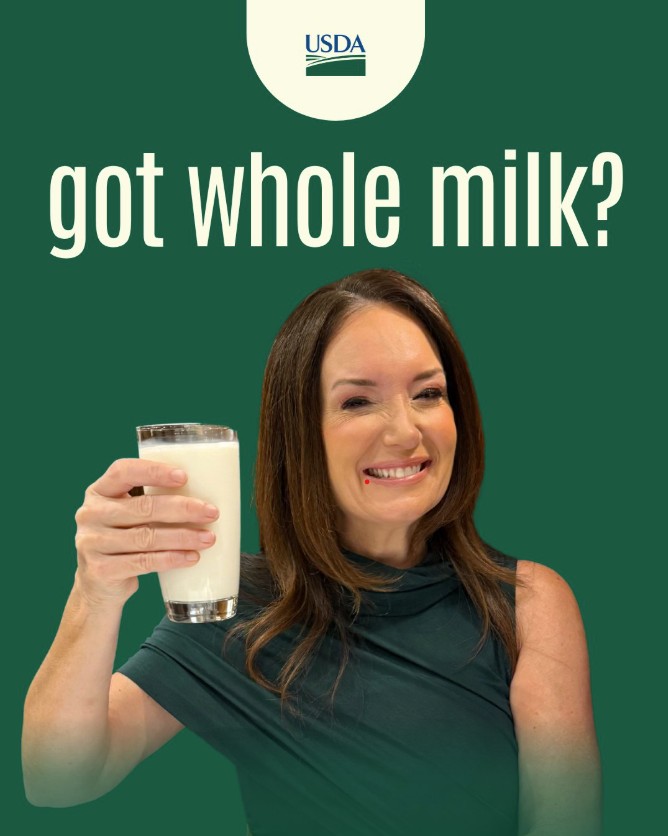
I can hardly get my head around this.
Here is USDA Secretary Brooke Rollins doing a version of the dairy industry’s milk mustache campaign celebrating the reintroduction of whole milk into schools.
Our otherwise dysfunctional Congress has managed to pass a bipartisan bill, “The Whole Milk for Healthy Kids Act of 2025.”
The bill overturns previous restrictions on whole-fat milk and dairy alternative milks in schools. Now:
I. Schools may offer students dairy milks—or nutritionally equivalent non-dairy beverages
- flavored (e.g., chocolate) and unflavored
- organic or nonorganic
- reduced fat, low-fat, and fat-free
- lactose-free
II. Milk fat will not count as saturated fat in rules about saturated fat limits
The Physicians Committee for Responsible Medicine is happy about the the non-dairy alternatives.
But this has to be counted as a clear win for the dairy industry, desperate to get whole and flavored milks back into schools.
The rationale?
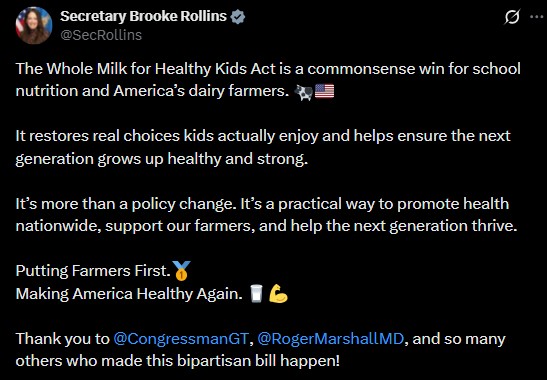
How will doing this make kids healthier?
Here is my milk summary table from What to Eat Now.
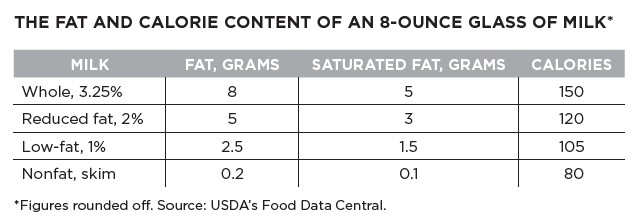
And this is before the chocolate and sugar get tossed in.
How much difference will it make to kids’ overall calorie and saturated fat intake? My guess: probably not much.
Here are my immediate questions:
Note: all of these are about the selling of milk, not health.
That’s because this is not a health initiative; it is a dairy promotion initiative.
Alert to readers: Amazon.com displays listings for several more workbooks, study guides, and cookbooks purportedly based on my book, What to Eat Now (see previous post on this). I did not write any of them. Caveat emptor!
___________________________
As I keep saying, food companies are not social service or public health agencies. They are businesses with stockholders to please and pleasing stockholders is their first priority.
Even so, I am occasionally still shocked by business practices.
Here’s one: Same Product, Same Store, but on Instacart, Prices Might Differ
The shoppers were volunteers, participating in a study published on Tuesday and organized by the Groundwork Collaborative, a progressive policy group, and Consumer Reports, a nonprofit consumer publication. In tests in four cities across the country, nearly 200 volunteers checked prices on 20 grocery items on Instacart.
They found considerable variation in prices charged for the same market basket of food items at the same store at the same time.
I went right to the study. The results:
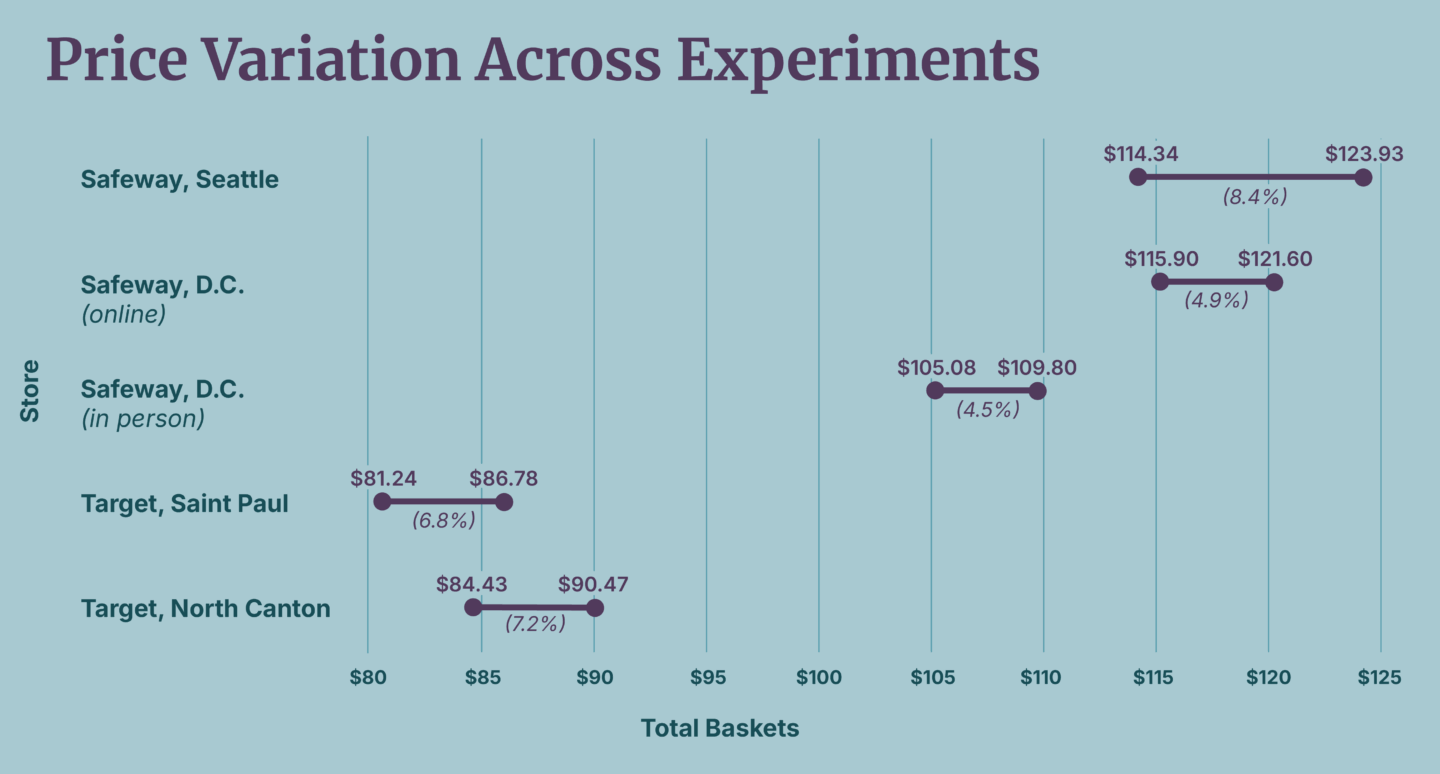 I knew this was happening with airline prices (if you search for a specific flight and look for it again later the price will be higher).
I knew this was happening with airline prices (if you search for a specific flight and look for it again later the price will be higher).
But food? Apparently so.
The Federal Trade Commission is already after Instacart for gouging customers with unspecified fees and difficult refund policies, as I leared from reading Instacart to Pay $60M to Settle FTC Claims It Deceived Shoppers.
FTC alleges the company misled consumers on fees and memberships while Instacart denies wrongdoing, citing compliance with law.
Instacart has agreed to pay $60 million in refunds to settle the U.S. Federal Trade Commission’s allegations that the online grocery delivery platform deceived consumers about its Instacart+ membership and free delivery offers…Instacart’s offer of “free delivery” for first orders was illusory because shoppers were charged other fees…The company did not adequately notify shoppers that free trials of its Instacart+ subscription service would convert to paid memberships, and misled consumers about its refund policy, the agency said.
And now dynamic pricing?
When you sign up for Instacart, you give the company personal data it can use to charge you the highest price possible.
Instacart claims it is not breaking any laws.
The Trump administration says it is taking on all this.
Instacart now says it won’t do this anymore.
Yay!
Alert to readers: Amazon.com displays listings for several more workbooks, study guides, and cookbooks purportedly based on my book, What to Eat Now (see previous post on this). I did not write any of them. Caveat emptor!
___________________________
Thanks to Erin Croom from Small Bites Adventure Club! for sending this one.
Comment: The point of all this was to demonstrate that public health recommendations to reduce sugar intake in order to reduce the taste for sugar won’t do any good, so why bother. To restate the obvious: sugars have calories but no nutrients, and taking in a lot of them at once—as in soft drinks—messes up metabolism and is best avoided. Eating less of sugary foods and drinks is always a good idea. But, as I am always pointing out, eating less is bad for business. Hence this study.
Last week I was heartbroken to receive a message from Danielle Ofri, the editor of the Bellevue Literary Review, announcing the death of Jerome Lowenstein, who had been my primary care doctor for more than 20 years.
To say that the editors of Bellevue Literary Review were saddened to learn of the passing of Jerome Lowenstein, MD, is an understatement. Jerry was our founding nonfiction editor, one of the original sparks that led to BLR’s creation.
How lucky I was to be his patient. I would schedule my appointments late in the afternoon when we could talk for hours, mostly about his research on kidney function. He was a practicing nephrologist, but had a small primary care practice to which I felt privileged to belong.
Here’s how that happened.
In California, I had been a Kaiser Permanente patient since childhood, and was used to non-profit medical care. Dealing with for-profit New York health care was difficult, and in the mid-1990s I had an unsettling experience with an excessively interventionist (in my view) primary care doctor, who I never wanted to see again.
Soon after this incident occurred, I was reading the New England Journal of Medicine when I came across a review of a book by an NYU doctor named Jerome Lowenstein, The Midnight Meal and Other Essays about Doctors, Patients, and Medicine. The reviewer, Robert Schwartz, said:
He values words and explores how they reveal attitudes about patients. He hates dehumanizing and judgmental jargon and deplores the psychic numbing of overworked residents…He teaches by example, learns from patients, values the physical examination, and doubts — profoundly doubts — the utility of outcomes research. Lowenstein finds evidence-based medicine disturbing, frightening, and anti-intellectual.
He worked at NYU? I worked at NYU. I looked up his email address, recounted my story, and asked if he could refer me to a primary care doctor who viewed medical care the way he did.
He said he had a small primary care practice, and that I sounded like his kind of patient. Would I like to see him.
Would I ever!
When he gave up his practice some years ago, it felt like a crisis. He arranged for all of us to be seen by Dr. David Kudlowitz, and that’s also worked out well.
I loved him. I was not alone in that.
Farewell, dear doctor. I will miss you and so will the world.
Obituaries
If you are wondering what’s going on at the FDA, and why everyone seems to be worried about its current leadership, take a look at this instructive post on X: “Nearly 90% of senior leaders who were at the FDA a year ago are no longer there.”
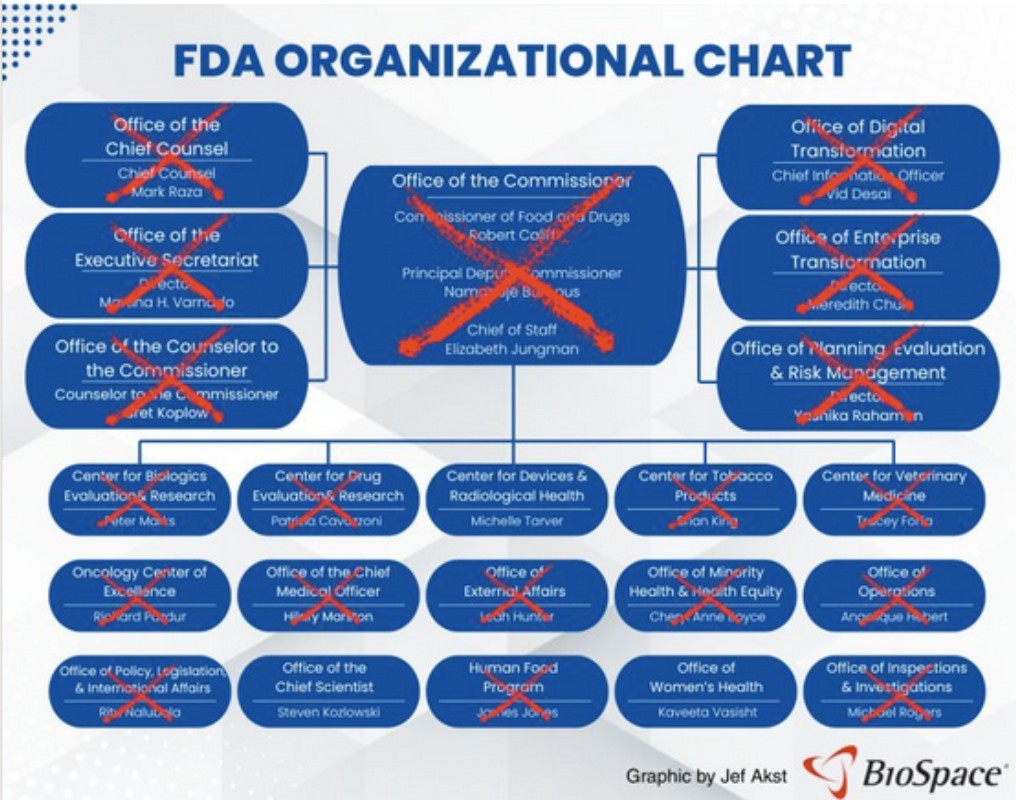
The USDA just announced the addition of six states to the list of waivers that allow them to restrict soft drinks and sometime other foods and drinks from what SNAP recipients can buy with their benefits (they can still buy these things with their own money),
You can keep track of the waivers—now 18 states—at the USDA’s website, which provides a handy map.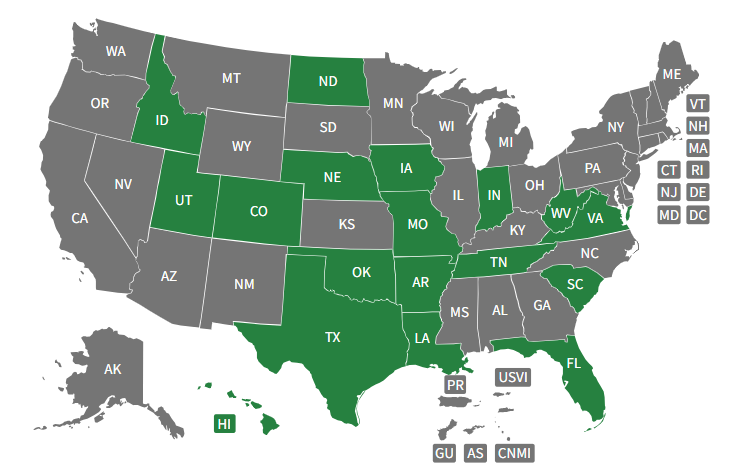
The site also has a table that gives the implementation date in 2026, and describes the restrictions. If you click on the state, you get the relevant documents. You also can keep track on a site run by the National Grocers Association.
The state waivers vary a lot in what they restrict:
Florida, for example, says
Starting in early 2026, soda, energy drinks, candy, and ultra-processed shelf-stable prepared desserts will no longer be available for purchase with SNAP benefits in Florida. Items excluded from SNAP purchases will include:
- Soda
- Energy Drinks
- Candy
- Ultra-Processed Prepared Desserts
Indiana, for another example, uses these definitions:
Candy: A preparation of sugar, honey, or other natural or artificial sweeteners in combination with chocolate, fruits, nuts, or other ingredients or flavorings in the form of bars, drops, or pieces. The term does not include any preparation requiring refrigeration.
Soft Drinks: Nonalcoholic beverages that contain natural or artificial sweeteners. The term does not include beverages that contain milk or milk products, soy, rice, or similar milk substitutes, or are exclusively naturally sweetened using natural vegetable and / or fruit juice.
And, just for fun, I looked up another one.
Oklahoma’s definitions
“Candy” means any solid, semi-solid, or molded preparation of sugar, sweeteners (natural or artificial), or chocolate, with or without added ingredients such as flavorings, fruit, nuts, or flour, that is commonly marketed, advertised, or recognized as candy, chocolate bar, chewing gum, or similar confectionery. For purposes of this section, candy includes but is not limited to chocolate bars (including products containing flour such as Kit Kat, Twix, or similar items), hard candies, gummies, caramels, taffy, licorice, mints, and chewing gum.
“Soft drink” means any nonalcoholic beverage that contains natural or artificial sweeteners, including soda, pop, cola, energy drinks, sports drinks, and flavored water, but excluding beverages that contain milk or milk substitutes, soy, rice, or similar dairy alternative ingredients, or that contain more than 50 percent, by volume, of fruit or vegetable juice…For purposes of this section, “soft drink” includes but is not limited to:
• Carbonated sodas
• Non-carbonated sweetened beverages
• Energy drinks, energy Supplements, and sports drinks (whether or not carbonated)
• Sweetened bottled or canned teas and lemonades
• Flavored waters with added sweeteners“Soft drink” does NOT include:
• Coffee or unsweetened tea
• 100% fruit or vegetable juice, or beverages containing more than 50% juice by volume
• Milk, milk substitutes, dairy-based drinks, or similar beverages
Yikes! It gives me a headache just thinking about what it’s going to be like for grocers to deal with this, let alone the manufacturers of restricted foods that differ from state to state.
All of the waivers are said to include evaluation plans. These will be interesting and we should start seeing them by 2027. Can’t wait.
Regenerative is the new buzzword for sustainable agricultural practices. Unfortunately, the term is undefined.
I like the approach of the Real Organic Project: regenerative begins with—and extends—certified organic production methods.
The USDA has now adopted the term for its own purposes: USDA Launches New Regenerative Pilot Program to Lower Farmer Production Costs and Advance MAHA Agenda. It
announced a $700 million Regenerative Pilot Program to help American farmers adopt practices that improve soil health, enhance water quality, and boost long-term productivity, all while strengthening America’s food and fiber supply…(HHS) is also investing in research on the connection between regenerative agriculture and public health, as well as developing public health messaging explaining this connection.
This sounds great, but what does it mean? Cutting through the rhetoric,
In FY2026, the Regenerative Pilot Program will focus on whole-farm planning that addresses every major resource concern—soil, water, and natural vitality—under a single conservation framework. USDA is dedicating $400 million through the Environmental Quality Incentives Program (EQIP) and $300 million through the Conservation Stewardship Program (CSP) to fund this first year of regenerative agriculture projects.
Oh. It’s investing in two existing programs that already paid farmers to reduce tilling, plant cover crops, and manage manure.
As Marcia Brown explains in Politico
It’s the most significant commitment toward regenerative agriculture the Trump administration has announced yet, but it comes months after it axed similar Biden-era conservation programs and as it pushes ahead with approvals for new pesticides that are considered forever chemicals.
She quotes Stephanie Feldstein of the Center for Biological Diversity:
Regenerative agriculture needs to be more than just buzzwords Big Ag uses to greenwash business as usual…While the Trump administration promises money for sustainable practices, it continues to cut conservation staff, support the pesticide industry, roll back environmental laws and play trade war games that hurt farmers and our food system.
Comment
All USDA agricultural support programs should require farmers to produce foods in ways that minimize damage to the environment. This initiative needs to come with specific requirements, clear definitions, and accountability. These are tiny programs in the context of USDA’s $20 billion annual expenditure on farm supports. If the agency is serious about producing food more sustainably—which it absolutely should be—it will define what it means by regenerative and apply those principles to all its programs.
Otherwise, this is flat-out greenwashing.